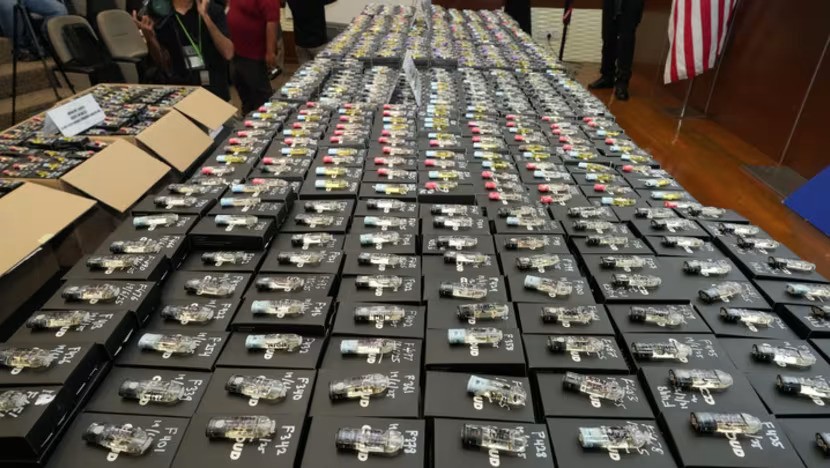On June 19, 2025, Malaysian police raided a suspected drug operation in Selangor, near Kuala Lumpur, and arrested four men — including three from Singapore. Authorities say the ring was producing vape cartridges laced with cocaine. This is being reported as Malaysia’s first known case of cocaine mixed into e-vaporiser liquids.
What happened

Police from the Royal Malaysia Police’s Narcotics Criminal Investigation Department (NCID) carried out the operation. They arrested a 57-year-old Malaysian and three Singaporeans (ages 46, 31 and 25). Two Singaporeans and the Malaysian were stopped in a car near a hotel. The third Singaporean was taken into custody in the hotel lobby.
During the raid, officers seized 10 boxes containing 4,958 vape cartridges. Investigators say the cartridges held about 9.42 litres of cocaine — with an estimated street value of RM7.29 million (roughly S$2.2 million). Each cartridge could deliver up to 100 inhalations, which makes them extremely dangerous if used as intended or if they leak into consumer products.
How the operation worked (allegedly)
Authorities say the syndicate rented luxury condominium units in Kuala Lumpur to blend and package the vape liquids. Then, those cartridges were apparently meant to be moved overseas. Police believe the scheme began in March 2025 and had a clear business model: manufacture, package, ship.
Reportedly, three of the suspects were low-paid workers earning about S$100–S$200 a day. The fourth appears to have been taking the lion’s share of the profits. Police suspect Malaysia was being used as a transit hub, with drugs possibly moved north by road from the south. The NCID described the operation as “highly organised.”
Legal stakes
If convicted under Malaysian law, the suspects face severe penalties: life imprisonment or even the death penalty in certain trafficking cases, plus caning. Malaysian authorities emphasized the need to crack down hard to stop networks that threaten both local communities and international transit routes.
Why this matters
- Different delivery, same danger. Vapes are mainstream. When criminals weaponise a popular product, the risk spreads — to casual users, teens, and children who can easily mistreat or be exposed to contaminated goods.
- Harder to detect. Liquid vapes that look normal can hide potent drugs. That makes interdiction and consumer vigilance more complicated.
- Cross-border angle. With suspects from Singapore arrested in Malaysia, the case highlights how drug syndicates use regional routes and temporary bases to move product. That raises questions about surveillance, transit checks, and international cooperation.
Safety note
If you buy or find unlabelled vape cartridges, avoid them. Don’t share or try cartridges from unknown sources. Children and teens must be kept away from any vape device not supplied and supervised by a trusted adult. If you suspect a product is dangerous, contact local law enforcement.
Wider context
This case should be a wake-up call to regulators, retailers and users. The exploding popularity of vaping has created a new surface for criminal exploitation. Regulators need testing, tighter import checks, and clear product-safety rules. Retailers should vet suppliers. Consumers should treat unknown vape products like any suspicious substance: don’t touch, don’t use, report.
My take

Look, adults have always found creative ways to make trouble when money’s on the table. But swapping cocaine into something people inhale casually? That’s reckless beyond words. It’s not just about smuggling or profit — it’s about normalising a way to hide lethal substances inside everyday items.
Here’s what I think should happen next: stronger screening at transit hubs, mandatory testing for high-risk vape imports, and public education campaigns — fast. Enforcement alone won’t stop this. You need prevention, smarter customs checks, and the kind of community awareness that makes shady products socially unacceptable. Finally, the people earning crumbs while one person pockets profits deserve scrutiny too — are they coerced? Desperate? That human angle matters for prevention.
Quick Q&A
Could a vape cartridge actually deliver cocaine safely? No. Cocaine isn’t meant for vaping. Users risk overdose, poisoning, and unknown long-term harms.
Should I panic if I use vapes? No, but be cautious. Buy only from reputable sellers, check packaging and labelling, and avoid second-hand cartridges. Report anything suspicious.
Sources: Royal Malaysia Police (NCID) statement; local Malaysian news reports (June 19–20, 2025).







